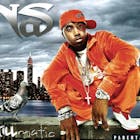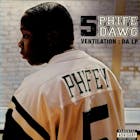
Classic Albums: 'Breaking Atoms' by Main Source
Classic Albums: 'Breaking Atoms' by Main Source
Published Fri, July 23, 2021 at 5:02 PM EDT
William Paul Mitchell always had big dreams. He loved Hip-Hop, DJing and beats.
The Queens native was just a teenager making pause tapes with an SK-1 and cassettes when he met producer/engineer Paul C. McKasty. McKasty was the whiz behind the Ultramagnetic MC's Critical Beatdown who was working with Eric B. & Rakim. He saw something in the younger Paul and immediately took Mitchell under his wing. McKasty's star was rising rapidly when he was shockingly murdered in 1988, a crime that remains unsolved.
"It was crazy, because as a child I wasn’t even accustomed to anyone dying," Mitchell would recall later. "Around my way, we had one fatality and that was my little man Jamal. He got hit by a car, but other than that I hadn’t even known anyone dying."
Paul C's murder shocked but refocused his protege. Paul Mitchell knew he needed a name. And his early moniker "Paul Juice" wasn't going to cut it. He chose something that had to speak to his ambitions.
He settled on "Large Professor."
"My father told me, 'That’s a powerful name, you’re going to have some big shoes to fill, but I know you have the energy and you have the heart to do it. Go and do your thing.' Once I got my mother’s and father’s approval, it kind of took away anyone else’s doubt."
Pretty soon the doubters would be few.
Large Pro’s clever sampling was setting a new standard at the dawn of the 90s; his gifted ear fine-tuned under the tutelage of the late Paul C.
Paul's help with Large Professor's production on Main Source's demo led to the trio landing a record deal with Wild Pitch Records, an eclectic label founded by Stu Fine. Gang Starr, Lord Finesse and eventually the Ultramagnetic MCs were among the big names that found a home at Wild Pitch, and Main Source would land there in 1991.
Paul C had given Large Professor a crash course on the SP-1200 sampler, and Extra P was beginning to use it in imaginative and exciting ways. Large Professor completed Paul C's work on Eric B. & Rakim's Let The Rhythm Hit 'Em while he was still in high school, also doing uncredited work for Kool G Rap and DJ Polo. In 1991, his former high school mates K-Cut and Sir Scratch recruited him to join their group, Main Source.
“Main Source is unique, I feel, ’cause there’s three different styles in the music. Me, I listen to Reggae, Soul—all type’ of music. We all combined different styles,” K-Cut would say in a 1991 video interview with Slammin’ Rap Video Magazine. The trio dropped it's first single in late 1990, and "Looking At the Front Door" made it clear that Main Source was for real, and Large Professor was a force.
“'Front Door' was great, because it just came together," Large Pro recalled to Red Bull Music Academy in 2015.
DROP YOUR EMAIL
TO STAY IN THE KNOW
"It was just that young, high school energy. The young high school dude, confused about relationship issues. It was just a high school time, but it was serious though. My father, he would say, “Men, you putting a record out. Wow, so you speaking out to the world.” He would always kind of give me these broad things. Not telling me what to do, but getting me in the right mindframe. I knew that it was serious, whatever it was that I was doing."
The rest of Main Source's debut album would be no less stellar. Large Professor's years working in the shadows, his understudying of Paul C, it all paid off on what would be hailed as one of the greatest debut albums in Hip-Hop history. While so many of his peers were still milking James Brown samples, Large Pro was dabbling in obscure jazz and reggae; while also showcasing himself as a more-than-competent MC, with his Nation of Islam background informing his often-topical rhymes.
"Snake Eyes" takes aims at disreputable "friends" with ulterior motives, and the consequences those disloyal characters often face. "Watch Roger Do His Thing" is a heartfelt defense of a neighborhood kid who is avoiding trouble and toeing the line to achieve something great in his life. "Just A Friendly Game of Baseball" famously uses America's Favorite Pastime as a metaphor for police brutality; the song's remix would appear on the soundtrack to John Singleton's Boyz n The Hood.
On "Just Hanging Out," Large Professor extolls the simple joy of just being around friends. The entirety of Breaking Atoms sounds like observations from the neighborhood, but these aren't really hustler tales. It also sounds like socio-political commentary, without ever feeling like "political rap." Large Pro's forceful-but-unassuming flow fits his matter-of-fact perspective, throughout ...Atoms, he's a Hip-Hop everyman of the highest order.
"Just Hanging Out" is Breaking Atoms' thematic centerpiece, but the album's most mythologized track is undoubtedly "Live At the BBQ," the song that introduced the world to Akinyele and a young upstart named Nas.
Large Professor had been doing work on Let The Rhythm Hit 'Em when Eric B. let him know there was a surplus of studio time. So Large Pro invited a young rhymer he knew from Queens in for some sessions. That laid the foundation for a bond that would continue for decades.
"I knew where I was going and he knew where he wanted to go. He knew where he was going. We bugged out, but we knew where we wanted to go, we knew where we wanted to get to. We could go out in the hallway at the studio and play, but when it was like, “All right fellas, the mix is done.” All of that shit would stop, and dudes would get focused. That serious attitude, that responsibility, I always liked about him. Even when I was offered studio time from an Eric B. and Rakim no-show session, I knew that I could rely on Nas because he was no nonsense with it."
And no-nonsense was how Nasir Jones sounded when he dropped that iconic first verse. He showed up on "Live At the BBQ" like a cagey veteran, equal parts heart and shock. It was the first shot fired in a career of one of the best to ever do it.
Breaking Atoms wasn't a multi-platinum smash back in 1991. In a year that saw seminal releases from N.W.A., A Tribe Called Quest, Ice Cube and others, it still stands as one of the most remarkable albums of the early 1990s. Large Professor's talents would set the stage for so much East Coast music that followed. He would eventually split from the group and amplify his legacy as a hit-making producer for Nas, Tribe and so many others. But it all started here.





